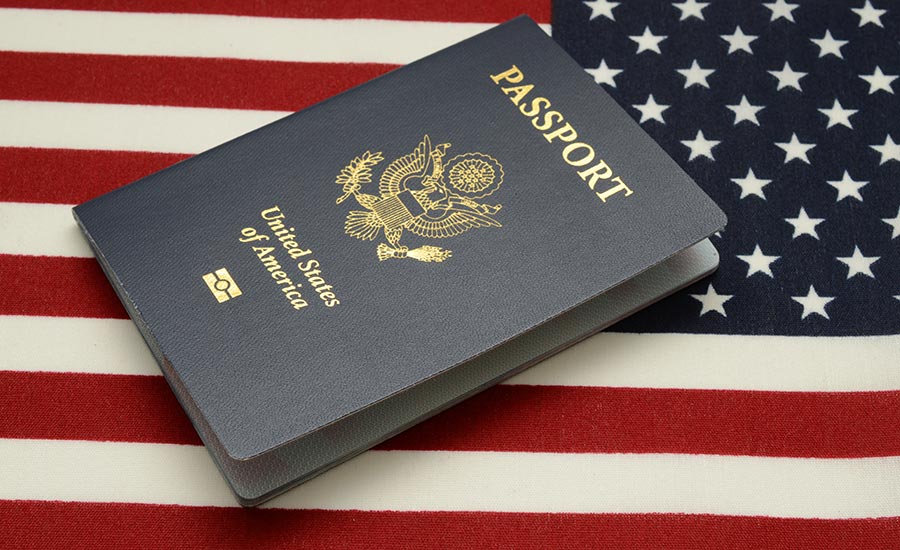

Marrying A US Citizen: Key Takeaways
- Depending on whether you marry a U.S. citizen in the U.S. or abroad, the immigration process to join them in the U.S. will vary
- The main ways to apply for permanent residence through marriage are through adjustment of status (if in the U.S.) or consular processing (if abroad)
- Marrying a U.S. citizen offers additional opportunities, including access to work education, and family reunification
- Working with an immigration attorney ensures accurate and timely document completion and filing and improves your chances of success
If you’ve fallen in love with a U.S. citizen, whether while visiting on a temporary visa or meeting abroad, you might be wondering about your future together.
Can you stay in the United States? What does the process look like?
In this article you’ll find:
- The steps to marrying a U.S. citizen in the United States
- What to expect if you marry a U.S. citizen outside the United States
- What new opportunities marriage can unlock
Marrying A US Citizen In The US
If you want to get married to a U.S. citizen while you are in the U.S. on a temporary visa and plan to remain in the country, there are several steps to this process.
1. Check If You Meet Marriage Eligibility Requirements
To marry a U.S. citizen, both you and your future spouse must meet several criteria:
- Age: In most states, the legal marriage age is 18 years. Some states allow marriage with parental consent if you are between 16 and 18 years of age, while a third group of states allows parties to get married under the age of 16 with judicial approval.
- Marital status: You must be single at the time of the marriage.
- Mental capacity: You must be able to understand the nature of the marriage contract along with the rights and responsibilities it entails.
2. Obtain A Marriage License
Visit the local county clerk’s office or courthouse to apply for a marriage license. Note that requirements and fees may vary by state.
If you live in a state that has a waiting period between obtaining the marriage license and the actual marriage ceremony, you will typically have to wait anywhere between a day and a week.
3. Perform The Marriage Ceremony
Whether a civil ceremony by a judge or a religious one by an authorized officiant, make sure you have at least one witness present at the event.
After the ceremony, you will receive a marriage certificate as evidence of your legal union, a key document for further immigration processes.
4. Ask Your Spouse To File Form I-130
To establish the relationship between you and your U.S. citizen spouse, your partner must file Form I-130, Petition for Alien Relative, with the U.S. Citizenship and Immigration Services (USCIS).
I-130 processing time for spouses of U.S. citizens in 2025 can take between 17 and 64 months.
5. Apply For An Adjustment Of Status
If you entered the U.S. on a valid visa or have lawful status, you are eligible to file Form I-485, Application to Register Permanent Residence or Adjust Status.
Adjustment of status allows you to:
- Apply for a Green Card based on your marriage to a U.S. citizen.
- Stay with your spouse in the U.S.
- Work while your case is processed.
Marrying a U.S. citizen allows you to file Form I-130 and I-485 together, a process known as concurrent filing, since there are no visa number limitations for immediate relatives of U.S. citizens.
I-485 processing time for family applications in 2023 can take between 12 and 32 months on average, as per the USCIS processing time tool.
6. Attend A Biometrics Appointment
Once you file Form I-485, you may be scheduled for a biometrics appointment where officials will take your fingerprints, photographs, and other identifying information for background checks.
7. Attend An Interview
To confirm the legitimacy of your marriage, you and your U.S. citizen spouse will be scheduled for an interview where USCIS officers will ask various marriage interview questions.
Those questions will typically focus on your relationship, family history, joint finances, daily activities, and more.
In the video below, Brad Bernstein, Managing Partner at Spar & Bernstein, provides examples of the questions you may expect.
8. Wait For Your Application Results
- If your adjustment of status application is approved, you will receive a Green Card granting your lawful permanent residency in the U.S.
- If your adjustment of status application is denied and you are in the country on a temporary visa, you will need to appeal the decision or return to your home country.
Some couples begin their journey on a fiancé visa, known as a K-1, which allows marriage within 90 days of arrival. Read more about K-1 visa requirements and the application process.
Marrying A US Citizen Outside The US
You can also get married to a U.S. citizen outside the U.S. and later join your spouse in the U.S.
If your love story unfolds overseas, you’ll follow a process called consular processing. This procedure allows you to apply for an immigrant visa at a U.S. Consulate or Embassy in your home country and enter the country as a lawful permanent resident.
Here’s how to begin your journey from abroad:
1. Verify The Marriage Laws In Your Country
Check the marriage requirements and laws in your country or the country where you are planning to get married. These can include submission of specific documentation, residency requirements, and certain waiting periods.
2. Visit The US Embassy Or Consulate
Contact the nearest U.S. Embassy or Consulate in your country and ask about specific requirements for U.S. citizens marrying abroad. Typically, the embassy or consulate will provide guidance and notary services for certain documents.
3. Obtain A Marriage License
Make sure you meet your local marriage license requirements, as every country has its own checklist that might involve submitting required documents, complying with waiting periods, and paying fees.
4. Attend The Marriage Ceremony
Plan and attend a marriage ceremony with an authorized officiant and witnesses.
5. Obtain A Marriage Certificate
Secure an official marriage certificate from the country where the marriage took place. This document is key to the immigration process.
6. Apply For A Marriage-Based Visa
Ask your partner to complete and file Form I-130 with USCIS and wait for its approval.
Once Form I-130 is approved, it will be sent to the National Visa Center (NVC) for further processing.
The NVC processing time may vary depending on various factors, such as the completeness and accuracy of filed documents, background checks, or security clearance.
After the NVC processes your petition, they will forward your case to the U.S. Embassy or Consulate in your country.
You will then have to file Form DS-260, Immigrant Visa Electronic Application.
7. Attend A Medical Examination
As part of the visa application process, you will need to undergo a medical examination by an authorized physician.
The medical examination ensures that you do not pose a public health risk to the U.S. community.
8. Attend A Visa Interview
Attend a visa interview at the U.S. Embassy or Consulate. You’ll answer questions about your relationship, shared experiences, and future plans.
You will also be asked to provide evidence of your genuine marriage: wedding photos, joint financial records, and letters, emails, or text messages with your U.S. citizen spouse.
9. Receive An Immigrant Visa
If your visa application is approved, you will receive an immigrant visa in your passport. You can then travel to the U.S. and reunite with your spouse.
10. Travel To The US & Receive A Permanent Green Card
After entering the U.S. on your marriage-based visa, you will receive a:
- Conditional Green Card, if you were married for less than two years (read more on how to remove conditions from your Green Card).
- Permanent Green Card, if you have been married for over two years.

Benefits Of Marrying A US Citizen
While marriage is a personal and emotional commitment, it can also provide new opportunities in a foreign country.
- Legal resident status and path to citizenship: Marrying a U.S. citizen allows you to apply for a Green Card and, eventually, U.S. citizenship, leading to long-term security and stability.
- Access to social benefits: As a lawful permanent resident, you can access various social benefits, including social security, healthcare, and retirement benefits.
- More job and education opportunities: Becoming a spouse of a U.S. citizen and pursuing citizenship opens the doors to employment and educational opportunities that may not be available to non-U.S. citizens, resulting in a better quality of life.
- Family reunification: Marrying a U.S. citizen allows you to reunite with family members more easily since you can sponsor other family members for immigration.
- Easier travel: As a spouse of a U.S. citizen, you may be eligible for expedited visa processing and fewer travel restrictions.
- Financial benefits: Marrying a U.S. citizen allows you to benefit from tax advantages and facilitates joint financial ventures, such as property ownership and bank accounts.
- Cultural exchange and exposure: As a spouse of a U.S. citizen, you are likely to be exposed to American culture, customs, and traditions, which will enrich your life with new experiences.

Planning To Get Married To A US Citizen? Contact Spar & Bernstein
With six decades of experience in immigration, including reuniting spouses in the U.S., The Law Offices of Spar & Bernstein will be your trusted legal partner if you are marrying a U.S. citizen.
Based on thorough research of your case, our team of experienced and compassionate immigration lawyers will:
- Help you adjust your status if your marriage took place in the U.S.
- Provide marriage-based visa guidance if your marriage took place outside the U.S.
- Help you prepare for your marriage interview.
- Help you remove conditions on your Green Card if you have been granted a conditional Green Card.
- Represent you before all government agencies.
- Update you on the progress of your case.
FAQs About Marrying A US Citizen
If you have not found the answer to your questions above, check out our FAQ section below.
Can I work in the U.S. after marrying a U.S. citizen?
Yes, as a foreign spouse in the U.S. on a marriage-based visa, you can typically apply for work authorization while your immigration case is pending.
Do I need an immigration attorney if I’m getting married to a U.S. citizen?
While hiring an immigration attorney is not mandatory, it can be extremely helpful.
Schedule an appointment with our caring and compassionate attorneys at Spar & Bernstein, who will guide you through the process, help with paperwork, and ensure your application is accurate and complete.
Can I obtain immigration benefits after marrying a U.S. citizen of the same sex?
Yes, same-sex couples have the same rights and opportunities as opposite-sex couples regarding immigration benefits.
Can I marry a U.S. citizen while in the U.S. on a tourist visa?
It is possible to get married while in the U.S. on a tourist visa. However, this is likely to raise questions about your intentions. Reach out to our team for legal advice.


